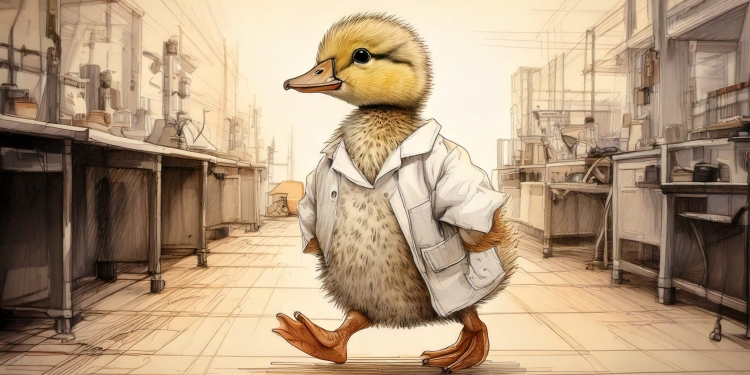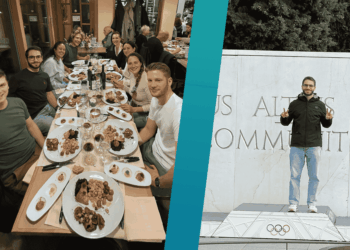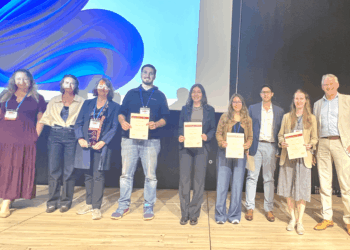My name is Ieva Ailte and I am a molecular biologist. I have been doing cancer research for 15 years. I started my career by doing fundamental cell research at the age of 26. The year was 2009 and I was a fresh student doing a Master’s degree in cell biology and biochemistry at the university. It was both exciting and overwhelming to enter a real research lab, wear the white lab coat and to explore the basic role of proteins and lipids in cancer cell lines. In the beginning, I felt like a duckling following the steps of my supervisor and asking “why” and “what” numerous times a day.
 After a while, holding the laboratory pipette became as usual as holding a fork or a spoon in my hand. When my right hand got tired of pipetting, I switched to my left. I ran various cell assays and experiments endlessly in the lab during these years. Several hundred successful experiments were done, but also plenty of unsuccessful. The cells could suddenly die, the chemicals would stop working. Hours and days of troubleshooting went by. The dark room with the confocal microscope and live cell imager became my second home. I learned a lot about biochemical properties of proteins and lipids, and how they regulate fundamental intracellular processes required for cell growth, such as cellular uptake, endocytosis, degradation and recycling.
After a while, holding the laboratory pipette became as usual as holding a fork or a spoon in my hand. When my right hand got tired of pipetting, I switched to my left. I ran various cell assays and experiments endlessly in the lab during these years. Several hundred successful experiments were done, but also plenty of unsuccessful. The cells could suddenly die, the chemicals would stop working. Hours and days of troubleshooting went by. The dark room with the confocal microscope and live cell imager became my second home. I learned a lot about biochemical properties of proteins and lipids, and how they regulate fundamental intracellular processes required for cell growth, such as cellular uptake, endocytosis, degradation and recycling.
After defending my PhD in 2017, I felt I want to explore more. So I applied for a postdoc position in a research group doing cancer immunology. A whole new immune system universe opened up for me! The list of new acquaintances was endless – T cells, B cells, monocytes, macrophages, myeloid-derived suppressor cells, tertiary lymphoid structures… It took me almost one year to get an overview of the complex structure of and interplay between innate and adaptive immune responses and cancer. I read immunology books and attended seminars to become familiar with the topic.
“We become better and stronger when we feel safe and join our forces to solve the complex issue that the cancer is”
But my curiosity did not stop there – I had a strong wish to move my research from a simple system of homogenous cell cultures in the dish and get closer to patient-material related research. So I moved on and applied for a postdoc position in a lab doing translational research on patient material (blood and tumour tissue) collected at the hospital. For the last four years I have been diving deeper and deeper in the tumour-immune microenvironment of patient samples, looking for biomarkers that might predict disease development.
Each transition throughout the years was tough, I felt like a newbie again and again, but I do not regret. I have expanded my knowledge and understanding of cancer-related processes from the molecule level in cells to the complex interplay of different cell types in patient tumours. It has also required lots of resilience and persistence to deal with the challenges along the way – experiments and hypotheses that failed, rejections to grant applications, challenges related to communication and human interactions. These experiences have played an essential role in shaping my identity, values, and perspectives. I have realised what kind of human and scientist I want to be. I support openness, politeness and trust. I wish to create warm and safe environment at work by participating and organising scientific and social events. We become better and stronger when we feel safe and join our forces to solve the complex issue that the cancer is.
For the last two years, I have been building a transdisciplinary network platform to connect specialists working on different aspects of the cancer (melanoma) – molecular biologists, statisticians, oncologists, surgeons, melanoma patient organisations, representatives from industry and young innovators. We arrange meetings four times a year. Each meeting consists of a presentation that illustrates activities, successes or challenges of the presenter, followed by discussions where people with different backgrounds and perspectives can share their insights and thoughts. My own scientific loneliness and need for knowledge exchange was the main driving force that initially made me organise these meetings. Now, I feel warmth and energy every time I see people gathering, having fruitful discussions and building new collaborations across the fields during these meetings. I truly believe that our strength and success depends on good and open communication, exchange of knowledge and mutual support.
I have also learnt along the way that people have very different opinions about how to do research, what is important and not, and how you should spend your time at work and outside the working hours. My advice is to find your inner voice and stay faithful to your values and goals. Listen and learn by your colleagues, friends and family, but don’t let others decide what is right for you. Last, but not least, I warmly recommend to set off time for other activities that give you joy, as well. Doing research is not a sprint; it is more like a marathon, so it is important to take care of ourselves and don’t burn out too early. Take a step back or take a break when needed, but don’t give up, if research is what you want to do.
I am very excited to see which new “universe”, unmet need or challenge will trigger my attention and curiosity next time, and how that will change the curve of my career path. My ultimate goal and dream is to contribute and advance cancer research, leading to better treatment strategies for patients with cancer.
 About the author:
About the author:
Ieva Ailte, PhD, molecular biologist, is a researcher in Metastatic Melanoma project group at the Department of Tumor Biology, Institute for Cancer Research, Oslo University Hospital, Norway. Co-founder and organiser of Melanoma Meet and Greet networking platform. She is a proud mother to two daughters and enjoys activities in nature such as hiking, cross-country skiing and kayaking. She loves a hot sauna when the weather gets cold in Norway.
About this article
This is one of our shortlisted entries for the 2024 EACR Science Communication Prize themed around our #KeepResearchCurious campaign. Choosing a winner was incredibly difficult and we’re delighted to share our shortlist with you.
The header image of this article was created using AI.



 About the author:
About the author:



